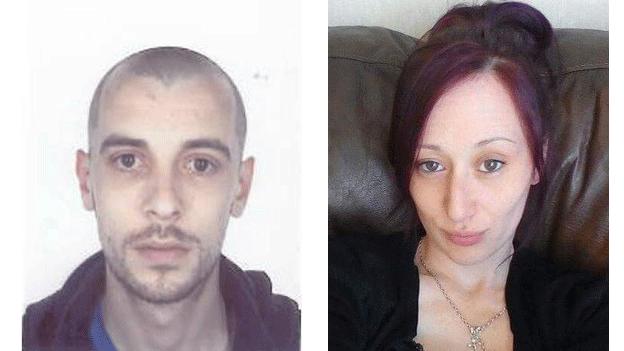M9 fatal crash delays: Policing under scrutiny as inquiries begin
- Published
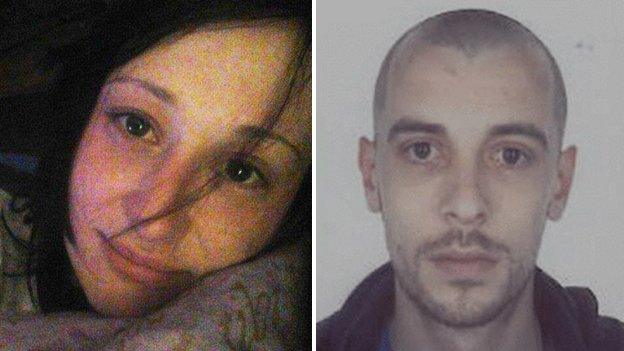
John Yuill and Lamara Bell were found in the car three days after the crash was first reported
An urgent review of policing in Scotland is being carried out and questions have been raised over the future of the country's top officer after two people were left in the wreckage of a car crash for three days.
John Yuill died in the crash on the M9 on Sunday, 5 July, and Lamara Bell died the following weekend in hospital.
Here, we look at how events have unfolded and at what happens now, with two investigations under way into the police's handling of the incident.

How did this all start?
Mr Yuill, 28, and Ms Bell, 25, were camping with friends and family on the south shore of Loch Earn, in Perthshire, on the weekend of 4 July.
The Falkirk couple were last seen in the early hours of Sunday morning, when they left the site in a light blue Renault Clio.
Later that morning, the car came off the M9 motorway just south of Stirling, near the Bannockburn slip road. The car skidded down a steep embankment into a field, where it was hidden from almost all passers by.
When police eventually found the car on Wednesday, Mr Yuill was dead and Ms Bell was in a critical condition.
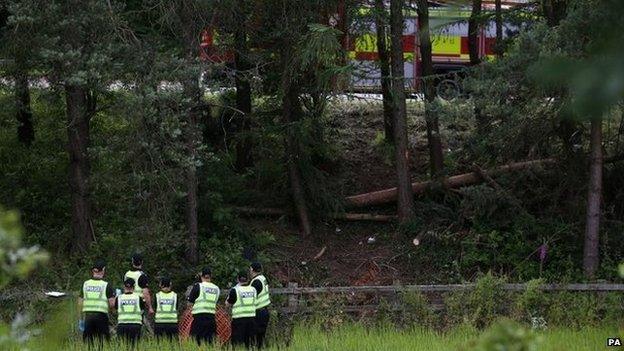
The car had gone down an embankment off the M9

Why did it take so long for police to find them?
Both families lodged missing persons reports with police on Sunday, who in turn issued an appeal describing the couple's disappearance as "out of character".
When a member of the public reported seeing the car down the embankment on Wednesday, police initially thought the crash had happened that morning. Emergency services attended and the southbound carriageway was closed off for much of the day.
However, medics were confused by the fact that Ms Bell's cuts had started to heal, and when she was taken to hospital in Glasgow, damage to her kidneys from dehydration was discovered.
By that evening, Assistant Chief Constable Kate Thomson released a statement admitting that another call had been made to police on Sunday reporting a car off the road, which had never been followed up.

What happened when the first call was made on Sunday?
A member of the public phoned Police Scotland's non-emergency 101 number just before 11:30 on the Sunday morning, reporting that they could see a vehicle down an embankment.
The call was answered within six seconds by an "experienced officer", who was told all of the relevant details including the exact location of the crash.
The caller has since told BBC Scotland that the officer sounded like he knew what he was doing, and was not dismissive.
However, for "reasons yet to be established", the call was not logged on police computer systems or forwarded on to local officers to follow up.
It was not until a second member of the public came forward with a similar report on Wednesday that officers were dispatched to the scene and found the car.
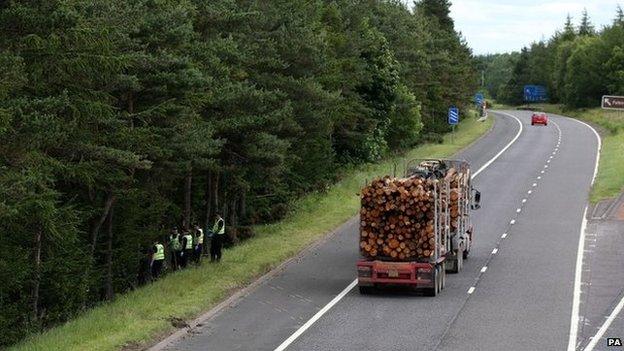
The car went off the M9 near Stirling on Sunday

What was the immediate response?
With Ms Bell in an induced coma in hospital in Glasgow, her family said they were angry and disgusted by the way the case had been handled by police.
In her statement, Assistant Chief Constable Thomson said "a full investigation" into the crash was under way, although at that stage she only conceded that officers believed the crash was "connected to the ongoing missing persons search" for Mr Yuill and Ms Bell.
Under direction from the Crown Office, the Police Investigations Review Commissioner then announced it was investigating the circumstances around the Sunday call.
However, there were soon calls for a wider inquiry. Scottish Liberal Democrat leader Willie Rennie wrote to the justice secretary asking for an "independent investigation" into the crash and "wider problems within Police Scotland".
On Friday, two days after the news broke, chief constable Sir Stephen House publicly apologised to the families of Mr Yuill and Ms Bell, and "the people of Scotland", admitting that his force had "failed" the victims.
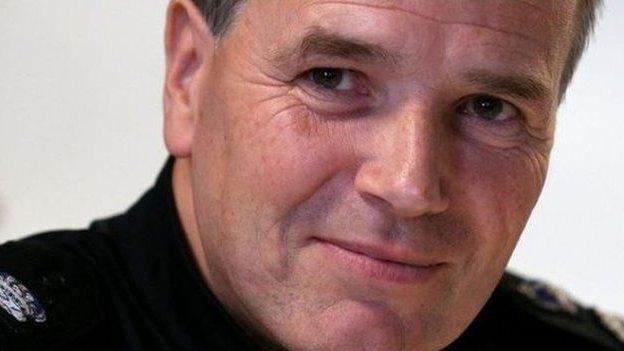
Sir Stephen House apologised to the families of Lamara Bell and John Yuill

How is this linked to the reorganisation of Scotland's police forces?
Police Scotland was formed in 2013 with the merger of the country's eight local police forces and specialist services.
The move saw the introduction of the 101 non-emergency number, and also saw the number of police control rooms taking the calls cut from 11 to five.
In his letter to the justice secretary, Mr Rennie said there was "a growing body of evidence" that the move has "had a detrimental impact on quality of service".
He also raised concerns about a "targets culture within the force", increasing workloads and said the morale of officers and civilian staff was at "an all-time low".
Scottish Labour's justice spokeswoman Elaine Murray also attacked the single force, saying: "Police Scotland is not working in the way many of us envisaged it would. There were warning signs that the system was not working well and perhaps inquiries should have been made sooner."
However, First Minister Nicola Sturgeon has given her backing to Sir Stephen and told BBC Scotland there was nothing to suggest at this stage that there was a "wider systemic issue".

What happens next?
One week on from the crash, it was confirmed that Ms Bell had died in hospital. Her brother thanked the people of Falkirk for their support as fundraising events to support the families and help pay for the funerals were announced.
The Scottish government has announced that Her Majesty's Inspectorate of Constabulary in Scotland is to undertake an "urgent review" of police call handling in the country.
Ms Murray said Sir Stephen should consider his position, due to "a number of problems", although she added that it was important not to single him out as a scapegoat.
Sir Stephen told BBC Scotland on Monday that he would not be resigning - and that the "massive changes" brought by the creation of the single Police Scotland force were not to blame for the delay.
As of Friday, the officer who took the initial call was still on duty, with Mr House noting that Police Scotland was "legally constrained" from saying or doing much more while the Pirc investigation was ongoing.
The families of John Yuill and Lamara Bell will now await answers - from the police investigation of the crash itself, from the Pirc investigation of the police response, and from the HMICS inquiry.
Justice Secretary Michael Matheson said it was "essential" that answers were found quickly following an "extremely tragic case".

What will happen during the inquiries?
The Police Investigations and Review Commissioner (Pirc) has the same powers as police officers to investigate incidents, including carrying out interviews, gathering or seizing production, and even arrest. It also offers family liaison.
Its investigation will ultimately result in a report going to the Crown Office, which will then make a decision on whether any criminality was involved - or whether a fatal accident inquiry should be held.
The Pirc has a staff of about 50, the majority of whom are involved in investigation work. It is impossible to say how long its inquiry will take, as it will be conducted in the same way as a police investigation into a crime.
Once the evidence has been gathered, it will be signed off by the commissioner, who will pass it to the Crown Office.
HMICS is giving its investigation priority over the other inspections it is carrying out.
It has begun discussing its terms of reference, and what it will be expected to investigate, with the Scottish government and Police Scotland.
There will then be a "scoping exercise," during which staff will work out how many resources they will need for the investigation, where they will be deployed, and how their work will be allocated.
This is a routine exercise which HMICS carries out before any inspection, and should take just a few days.
HMICS is at pains to point out that as its investigations are evidence-led, it is impossible to speculate how long this one will take - particularly at the moment before its terms of reference are settled.
- Published13 July 2015
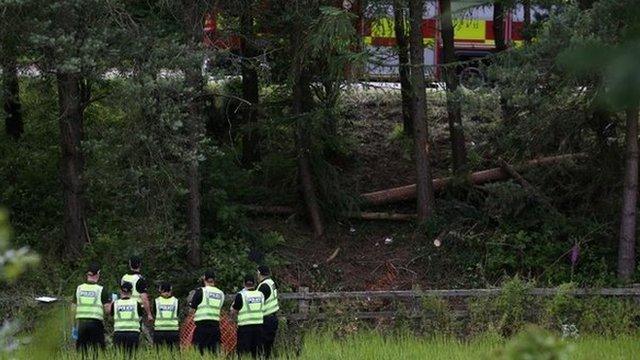
- Published13 July 2015
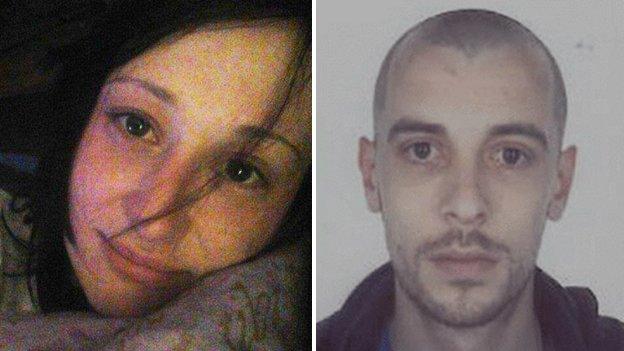
- Published9 July 2015
